
The 2020 freelancer income report : Based on a survey of 7,000+ global freelancers
Table of contents
Introduction
Fueled by demographic changes, technology advances and shifting work paradigms, the freelance economy is booming as freelancing
becomes a preferred lifestyle choice for more workers around the world. New technologies make remote working accessible and more productive; online marketplaces and social media networks provide new venues for freelancers to promote their skills and find work; and cross-border payment platforms make it easier for them to get paid, regardless of where the client is and what currency they use.
Freelancing’s growing popularity is driven by global generational shifts. Mostly led by younger workers in pursuit of greater independence and fresh business opportunities, 54% of millennials in developed countries started or plan to start their own business.[1] And as many as 64% of millennial full-time workers want to have “side hustles” to make extra money.[2] For older workers, freelancing provides an attractive option to extend their career while gaining a new measure of freedom and flexibility.
1. Deloitte, Millennials and Wealth Management
2. Deloitte Insights, The alternative workforce, April 2019
To better understand the trends impacting this global movement, we surveyed 7,000+ freelancers from more than 150 countries including emerging markets such as Pakistan, the Philippines and the Ukraine. Survey respondents comprise a random sample of Payoneer’s cross-border payment platform users, providing unique insights into how these globally-enabled freelancers operate, what makes them successful and what rates they command.


General Manager, Payoneer
Key findings
| The worldwide average hourly rate charged by freelancers is $21, higher than the $19 average rate two years ago and well above the average hourly salary in most of the countries where the survey respondents are based. | |
  |
The freelance scene is young – close to 70% of the freelancers surveyed are under the age of 35 and 21% are under the age of 25. The youth movement is led by freelancers in Asia, where 82% of the survey respondents are under 35, compared to only 47% in North America |
  |
Experience is a major factor in the hourly rates commanded by freelancers. More experienced freelancers over the age of 55 earn more than twice as much as their 18-24 year-old peers |
| While workers at the beginning and end of their careers are more likely to be exclusively freelancing, the promise of a stable paycheck and the sense of security that comes with it seems to drive more freelancers to seek a company job while raising a family and caring for it. | |
| Dedication to freelancing pays off. Those who work exclusively as freelancers earn a higher hourly rate and are more satisfied with their lifestyle compared to those who split their time working for a company. | |
  |
The most popular field of work for freelancers is web and graphic design, followed by programming and IT. These fields are not necessarily the ones that pay the most – as rates may be depressed by a crowded market and a high supply of freelancers. |
| Freelancers in higher paying fields are not necessarily those experiencing the highest job-to-income satisfaction. Professionals in administrative roles exhibit the highest level of income satisfaction while earning the lowest average hourly rate. Conversely, freelancers in multimedia production have the lowest level of job-to-income satisfaction, despite being one of the highest earning fields. | |
| Having an advanced degree doesn’t always translate into a higher hourly rate for freelancers. Freelancers with only a high school level education earn more than their peers with a bachelor’s degree, and only slightly less than those with postgraduate degrees. When it comes to hiring freelancers — as opposed to salaried, full-time employees — clients pay closer attention to experience, portfolio and the ratings the freelancer received from other clients, while education appears to play a lesser role in the hiring process. | |
| Women’s participation in the freelance workforce has been slowly gaining momentum over the last few years, led by those in the translation and administrative fields. At the same time, there is still significant opportunity for more women to join the freelancing workforce. | |
  |
Female freelancers earn on average 84% of men’s earnings across all fields. While there is much room for improvement, this gap is substantially smaller than the 64% average for all workers reported by the World Economic Forum. |
| The gender pay gap is most pronounced in the finance and project management fields, while women earn more than men in marketing and web and graphic design. | |
| Social media is currently used by 74% of the freelancers to promote their services, up from 65% two years ago. The most significant change is the growing popularity of Instagram, now used by 21% of freelancers. |
Gen-Z & millennials lead the freelancer movement, but boomers are ahead in earnings
Technology advances and shifting work paradigms are fuelling a surge in freelancing: Collaborative technologies make it is easier for remote workers to communicate and contribute; online marketplaces make it easier for them to find work; and cross-border payment platforms make it easier for them to get paid, regardless of where the client is.
It should not come as a surprise that young workers are quick to embrace these fresh opportunities and lead the freelancer movement. Millennials (those born between 1981-1996) and Gen-Z (those born between 1997-2012) represent a vast majority of the global freelance workforce. Close to 70% of the freelancers surveyed are under the age of 35 and over a fifth are under the age of 25. The youth movement is led by freelancers in Asia, where 82% of the workers are under the age of 35, compared to only 47% in North America.
While freelancers start young, experience is rewarded with higher earnings. Freelancers over the age of 55, aka Boomers (those born between 1946-1961) are earning more than twice as much as their 18-24 year-old peers.
Freelancers’ ages & hourly rates
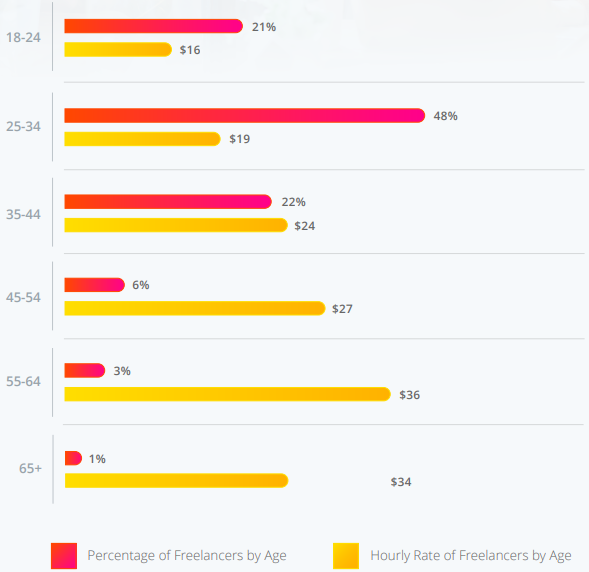

Freelancers love their freedom, but the realities of life can get in the way
Although for some workers freelancing supplements a company job, most freelancers (69%) go “all in” and dedicate themselves to their freelancing way of life. Workers in Western Europe are the most committed to their choice of lifestyle, with 77% of them working exclusively as freelancers. In contrast, 42% of freelancers in Central America and 41% of those in the Middle East split their time between working a company job and one or more freelance gigs.
Splitting time between freelancing and a company job is most common among workers in finance (52%) and QA (43%), and least common in marketing and web & graphic design (26% each). In addition, while workers at the beginning and end of their career are more likely to be exclusively freelancing, those in the middle of their career may view the security that comes with a stable pay-check as a driver to seek a company job during their family raising years.
Satisfaction from a freelance lifestyle is remarkably high, averaging 4 out of 5 across all respondents. Those who work exclusively as freelancers earn more and are more satisfied compared to those who split their time working for a company.
Exclusive & supplemental freelancing
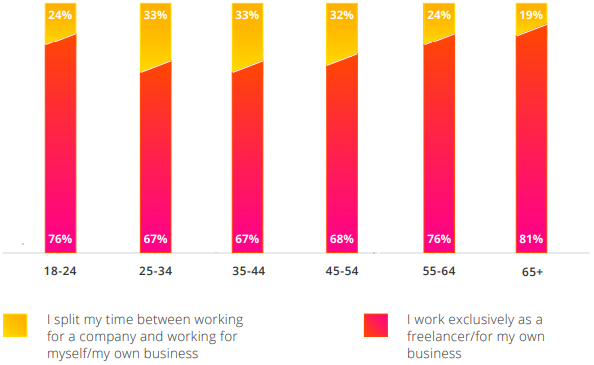

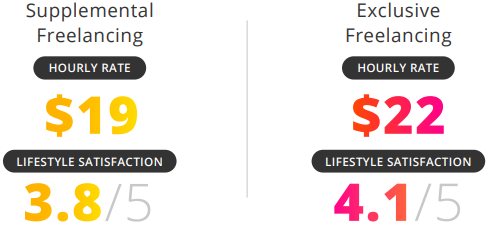

Where do freelancers work from?
Even with the growing proliferation of co-working spaces around the world, most freelancers do the majority of their work from their homes (83%).
Where freelancers work from
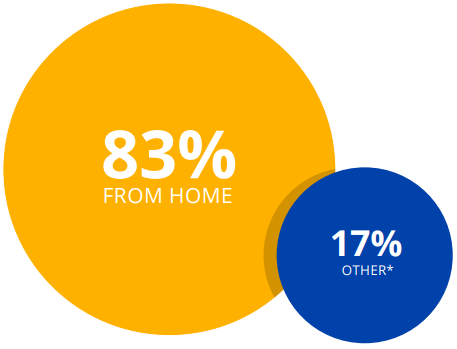

*Includes co-working space, coffee shop, client’s office, library and private office.
The freedom to work from home and flexible working hours are the two most prominent reasons freelancers are happy with their lifestyle, while the most common complaints are the difficulty of getting enough work and sustaining a sufficient income stream.
Money can’t buy happiness, but it sure helps
While freelancers value their freedom and flexibility, at the end of the day, they are still trying to make a living. Not surprisingly, satisfaction is tightly correlated to the overall annual income earned.
Income & lifestyle satisfaction according to annual income (scale 1-5)
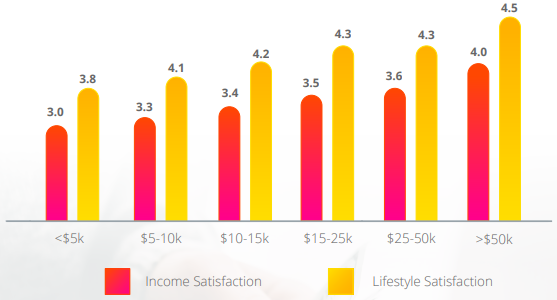

At the same time, freelancers in higher paying fields are not necessarily those with the highest level of job-to-income satisfaction. Professionals in administrative roles exhibit the highest level of income satisfaction while earning the lowest average hourly rate. Conversely, freelancers in multimedia production have the lowest level of satisfaction despite being one of the highest-earning fields.
Income satisfaction by field (scale 1-5)
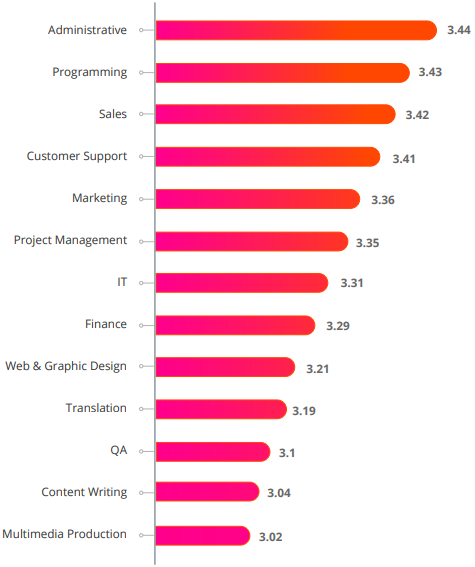

The gender gap is persistent, yet bright spots emerge
Women’s share of the freelance workforce has been inching up slowly from what we have seen in previous surveys. This rate is still lagging
behind women’s overall workforce share in most countries (39% worldwide) [3], representing a huge untapped opportunity for more women
to join the freelance workforce. These numbers also highlight how much more opportunity there is for women in general to enter the workforce (freelance, or otherwise) and how much more work needs to be done to balance out the male/female workforce divide.
Women’s share of the workforce
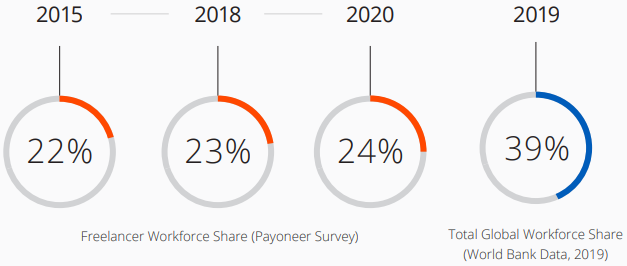

Several fields have a higher than average share of female freelancers
| Translation | 50% |
| Administrative | 46% |
| Content Writing | 43% |
| Customer Support | 43% |
| Project Management | 36% |
Some countries stand out with a higher than average share of female freelancers
| Philippines | 62% |
| United States | 47% |
| Serbia | 34% |
| Argentina | 30% |
| Ukraine | 30% |
Could freelancing be the great gender pay gap equalizer?
According to a report by the World Economic Forum, globally, women earn an average of 64% of what men earn for similar work.
Our survey shows that the mean hourly rate of female freelancers is 84% of the mean hourly rate of male freelancers across all fields. This
gives hope that the freelance workforce has the potential to close the overall mean gender pay gap in earnings.


As we take a closer look at different regions, progress in closing the gap seems to be uneven. North America, while leading the way in female share of freelance workers (44%), also boasts the largest mean hourly earnings pay gap – with female freelancers earning just 64% of the mean hourly rate of men across all fields. Asia Pacific, however, shows a far smaller percentage of female freelancers (17%) and a smaller
gender pay gap, with women’s mean hourly rates 85% of men – the lowest worldwide.
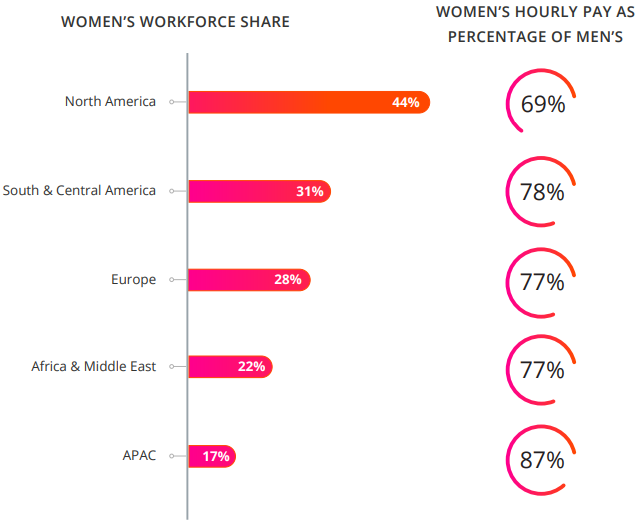

Pay rates are equalizing in popular freelancing fields
The gap in pay rates is most pronounced in finance and project management, where women’s mean hourly rate is only 53% and 56% of the mean hourly men’s rate respectively.
In contrast, women earn more per hour than men in marketing (+17%), web and graphic design (+4%), and multimedia production (+0.3%). With these three fields making up a large proportion of the female freelancer population (41%), here’s to hoping that women’s earning power will spread to other fields!
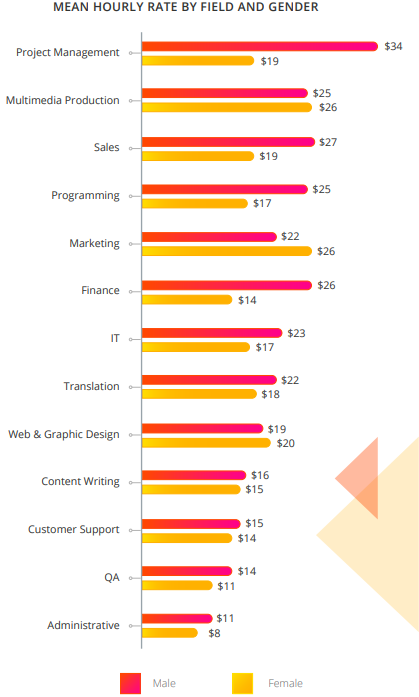

Design & tech pave the way globally
The most popular field of work for freelancers is web and graphic design, followed by programming and IT.
Primary field of freelancing
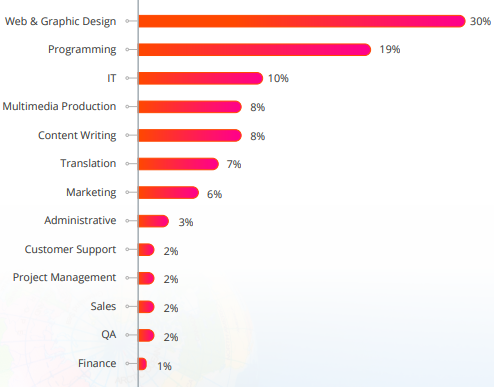

Oversaturation in certain fields is driving down pay
The most popular fields are not always the ones that pay the most. While many freelancers are looking to cash in on the demand for technical skills, pay in some of these fields may be depressed due to overcrowding and high supply of freelancers. To earn higher rates, freelancers might want to explore less crowded fields where demand is high, and competition is less intense.
Mean hourly rate by primary field
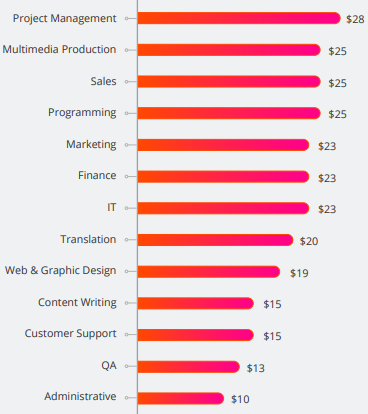

“Just Do It”: In the freelancing world, competence trumps education
Do you need a college degree to work as a freelancer? Not really. While the majority of respondents (57%) hold a bachelor’s degree or equivalent, 19% of global freelancers have only completed high school. Female freelancers are more likely to have an advanced degree than men – 31% of the women have a master’s or Ph.D. degree, compared to only 22% of the men.
Consistent with findings from previous years’ surveys, the impact of higher education on earnings is highly questionable. High school graduate freelancers earn more than those with a bachelor’s degree and only slightly less than those with post graduate degrees.
If you can get the job done, how you got there seems to be less relevant in the freelancing world. When it comes to hiring freelancers — as opposed to salaried, full-time employees — clients pay closer attention to experience, portfolio and the ratings the freelancer received from other clients, while education appears to play a lesser role in the hiring process, if at all.


Level of education
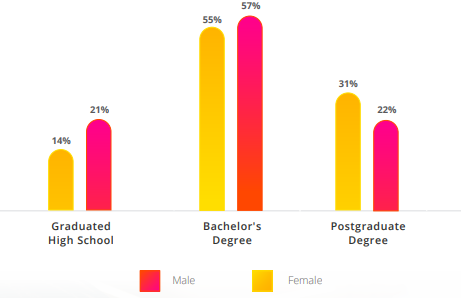

Hourly rate by level of education
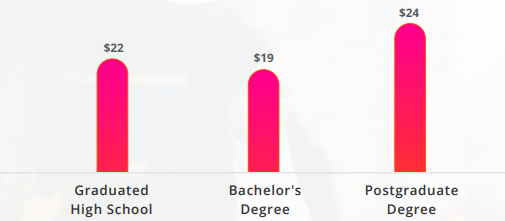

A picture is worth a thousand words: Freelancers embrace Instagram
As social media has become an acceptable and highly popular platform for businesses to promote themselves and stay in touch with their
clients, freelancers around the world are upping their social media presence to keep up with the growing competition. Social media is currently used by 74% of the freelancers, up from 65% two years ago.
The social networks driving this growth are not just the ones you might expect. More than a third of the freelancers (34%) use Facebook to promote their work, followed by LinkedIn (28%) – similar to the numbers reported in 2018. The most significant change, however, is the growing popularity of Instagram, now used by 21% of the freelancers compared to just 12% two years ago. As mobile is becoming a dominant platform, Instagram has become one of the fastest growing social media networks globally, with over 1 billion monthly active users.
Social media channels used for promotion*
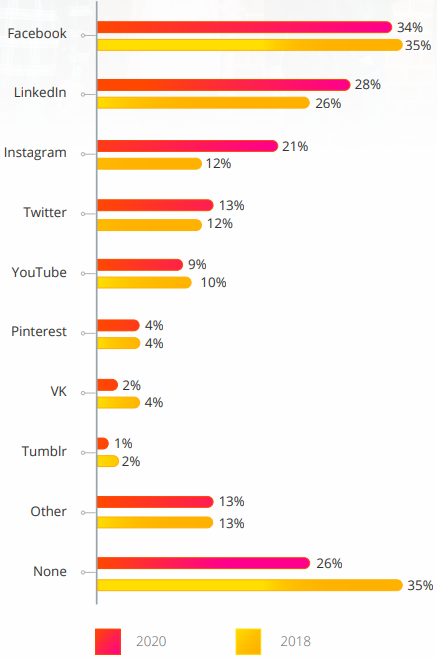

Takeaways for freelancers: Boundless opportunities
Our survey shows that freelancing provides attractive earning potential that in many cases far exceeds average wages, especially in emerging economies. And while we can’t escape the reality that the gender gap is still very prominent both in terms of work participation and pay, we are encouraged by the bright spots and progress being made in certain geographies and work fields where women are playing more prominent roles and making strides towards a more equal pay.
The high level of satisfaction from the freelancing lifestyle exhibited in the survey results is striking. It demonstrates that freelancing provides
not only an economic opportunity, but also a pathway to greater job satisfaction. For many, freelancing is the key to striking a healthier worklife balance, where one can set their schedule around their personal needs and family obligations.
With a growing need for help across all fields and skills, there is no time like the present to get a piece of the action. While technical skills are undoubtedly in high demand, many other fields offer even higher earning potential for workers, both with and without formal education. Whether you’re making the shift from a full-time salaried position or looking to supplement your existing job with some extra income, freelancing presents a wealth of opportunities. As freelancing becomes more popular, competition is expected to increase. Successful freelancers will be the ones who stay attuned to shifting needs, adjust their skills to match new and emerging requirements, and find innovative ways to promote their services and demonstrate value to their clients.
About Payoneer
Payoneer is the world’s leading cross-border payment platform, designed to empower global freelancers by connecting them to businesses, professionals, countries and currencies.
What sets Payoneer apart?
| Accept and make payments in multiple currencies via a simple and cost-effective solution | |
| Get paid by the world’s leading freelance marketplaces | |
| Send payment requests to your clients worldwide and get paid online | |
| Quickly access your earnings in your local currency at low rates | |
| Pay your sub-contractors for free |
| Are you a freelancer looking for a smart and easy way to get paid? |
Are you a freelance marketplace or business paying global freelancers? |
| Sign up | Learn More |




